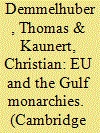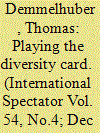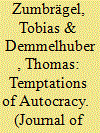|
|
|
Sort Order |
|
|
|
Items / Page
|
|
|
|
|
|
|
| Srl | Item |
| 1 |
ID:
134278


|
|
|
|
|
| Summary/Abstract |
The Persian Gulf region is of strategic importance to the European Union (EU). Yet, different political realities of authoritarian government in the Gulf challenge crucial parts of EU foreign policy that are based on normative power Europe concepts. Cooperation with the ruling dynasties appears beneficial for EU decision-makers if one looks at the comprehensive agenda of common interests in the Gulf region. In 2004, the EU aimed to build a strategic partnership with the Mediterranean and the Middle East; in this the EU emphasized its commitment to advancing its partnership with the Gulf countries. Yet, from the perspective of 2012 the results are bleak. Despite some signs of improvement in deepening the political, economic and security interactions with the region, there is still no concerted EU policy in the Gulf beyond the thriving bilateral activities of some EU member states. The events of the Arab Spring have increased the challenges even further. The EU, on the one hand, is trying to support forces of liberal and democratic reform in some neighbouring countries. On the other hand, it seeks close partnerships with authoritarian family dynasties in those Gulf countries in which a democratic opening is not around the corner. This article suggests an alternative explanation for this dichotomy. While there is an inherent tension between the EU's reformist agenda and its own interests, whether security or trade interests, this article argues that much of the EU's relationship with the Gulf countries can be explained through a misperception of the specific settings of government in the region. Despite a substantial agenda of interests on both sides in areas such as trade, energy, regional security, terrorism and irregular migration, the EU's foreign policy outputs remain rather limited.
|
|
|
|
|
|
|
|
|
|
|
|
|
|
|
|
| 2 |
ID:
169224


|
|
|
|
|
| Summary/Abstract |
Since the 2003 regime change in Iraq and the 2011 Arab uprisings, the political map of the Middle East has been in flux. Regional actors have taken advantage of emerging windows of opportunity, which have affected the outcome of this process. Saudi Arabia’s role as an aspiring regional hegemon in the region is salient: the country’s assertive course in shaping its neighbourhood coincides with a more independent foreign policy that goes beyond the traditional US alliance and seeks to diversify its international partners. This diversification of Saudi foreign policy since the ascension to the throne of King Salman in 2015 is explained by using the IR concept of hedging.
|
|
|
|
|
|
|
|
|
|
|
|
|
|
|
|
| 3 |
ID:
177202


|
|
|
|
|
| Summary/Abstract |
In 2011 mass protests began to rapidly spread across the Middle East and scholarly attention shifted to the Gulf region, which not only remained resilient but rather asserted its authoritarian rule. We argue that such a development is considerably shaped by an individual protagonist country, we call an “authoritarian gravity centre” (AGC). We understand an AGC as an autocratic regime that has the willingness and the capacity (in terms of material and immaterial means) to apply pressure, to disseminate autocratic ideas, norms, values, and techniques, and to constitute a role model for other countries in the AGC’s geopolitical proximity. This study, which covers the period between 2001 and 2015, provides an empirical analysis of Saudi Arabia acting as an AGC in the Gulf. The qualitative research is based on fieldwork conducted in Riyadh, Doha, Kuwait City, and Manama. Using the approach of the AGC, we offer a conceptualization of the phenomenon of autocratization in the Gulf region.
|
|
|
|
|
|
|
|
|
|
|
|
|
|
|
|
|
|
|
|
|